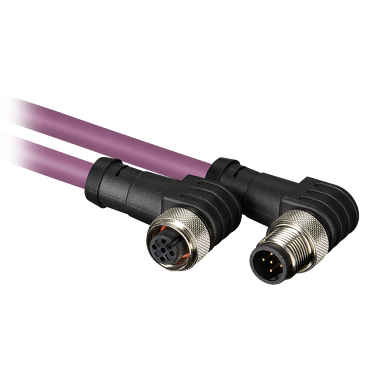In an increasingly digitized world, industrial connectivity is the backbone of modern manufacturing and automation. The ability to transmit data and power reliably and efficiently is critical for the seamless functioning of machines and systems. Among the many technologies that enable this, M12 cables have emerged as a versatile and robust solution for industrial connectivity. In this blog, we’ll dive into the world of M12 cables, exploring their applications, advantages, and why they are a crucial component in the Industry 4.0 landscape.
Understanding M12 Cables
M12 cables are a type of circular connector that follows the standard established by the IEC 61076-2-101 specification. These connectors come in various configurations, with the M12 designation indicating a 12mm diameter, typically featuring 3, 4, 5, or 8 pins. They are designed to provide secure connections for data transmission, signal integrity, and power delivery, making them ideal for a wide range of industrial applications.
Applications of M12 Cables
- Industrial Automation: M12 cables are widely used in industrial automation for connecting sensors, actuators, and other devices. They provide reliable communication in demanding environments.
- Ethernet Connectivity: M12 Ethernet cables enable high-speed data transfer, supporting industrial Ethernet protocols like PROFINET and EtherNet/IP. This is crucial for real-time data exchange in manufacturing processes.
- Sensors and Actuators: M12 connectors are commonly used to connect various sensors and actuators in machinery, allowing for precise control and monitoring.
- Fieldbus Communication: M12 connectors play a vital role in fieldbus systems, ensuring the efficient exchange of data between devices in distributed control systems.
- Harsh Environments: M12 cables are engineered to withstand harsh conditions, including moisture, dust, and vibration, making them ideal for outdoor and rugged applications.
Advantages of M12 Cables
- Robustness: M12 connectors are designed to endure harsh industrial environments, making them highly reliable.
- IP Ratings: Many M12 connectors are available with IP67 or IP68 ratings, ensuring protection against water and dust.
- Quick Installation: M12 cables are easy to install and replace, reducing downtime in industrial settings.
- Secure Connection: The threaded locking mechanism of M12 connectors ensures a secure and vibration-resistant connection.
- Compatibility: M12 connectors are widely adopted, ensuring compatibility with a variety of devices and systems.
- Future-Proofing: With support for high-speed data and advanced protocols, M12 cables are well-suited for Industry 4.0 applications.
Industry 4.0 and M12 Cables
The advent of Industry 4.0, with its focus on automation, data exchange, and smart manufacturing, has propelled the use of M12 cables. They are at the forefront of enabling efficient communication between machines, facilitating predictive maintenance, and optimizing production processes.
